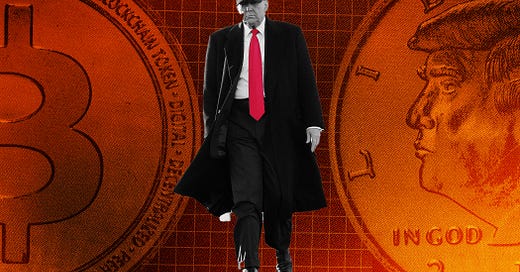1. DJT
Yesterday the Financial Times reported that the Trump Media and Technology Group (DJT)—of which I am a shareholder1—was in talks to buy a cryptocurrency exchange.
This may not seem like much, but it’s a layer cake of corruption and it’s taking place in broad daylight. Walk through the layers with me.
(1) How is DJT going to buy anything? Isn’t the company a joke? This is such a good question. So far in 2024 DJT has reported a grand total of $2.6 million in revenue.
That’s not a typo.
I’d like to give you a sense of scale here. An individual McDonald’s restaurant brings in north of $3 million a year.
So DJT as a company does a bit less business than your neighborhood Mickey D’s. There’s a difference, though. Individual McDonald’s locations average somewhere around 15 percent profits annually.
DJT does . . . not.
In the third quarter of this year—just a three-month period—DJT lost $19 million. And this rate of spend is increasing. For all of 2023, DJT lost $33 million.
(2) So how does DJT have the money to buy a crypto exchange?
DJT is not a business. A business generates revenue through some economic activity—making widgets, giving massages, trading derivatives.
The only meaningful economic activity DJT participates in is the issuance of shares in the company. I’d argue that DJT is best understood as a repository of value in the person of Donald Trump. There are three ways in which it functions:
A token for people who believe in Trump.
A vehicle for investors who speculate on the behavior of people who believe in Trump.
A mechanism for those seeking to funnel money to Trump as a means of influencing him.2
While these three functions are not businesses in the traditional sense, they have generated a great deal of money in the form of stock valuation.
The current market capitalization of DJT is $7.12b—that’s billion. Which gives DJT a P/E ratio of I’m sorry but I can’t stop laughing.
Only, it’s not a joke. With a $7.12b market cap, DJT has the ability to buy companies simply by paying with shares of its stock.
(3) Okay, so DJT is going to buy this crypto exchange by paying with shares of its stock. Why would DJT want to own a crypto exchange?
This is such a good question and I have an answer:
Crypto exchanges exist in a murky regulatory space. Some cryptocurrencies are considered by the government to be securities, and as such they fall under the jurisdiction of the SEC. Markets that function as clearinghouses for such crypto securities are similarly subject to SEC regs.
If a crypto exchange could guarantee that it would not be investigated by the SEC or become subject to any new SEC regulations, that would be a valuable asset.
Raise your hand if you think there is any chance—any chance at all—that under President Trump the SEC would dare to so much as look in the direction of a crypto exchange owned by DJT.
(4) Sure, but at least this crypto exchange was on the up-and-up pre-DJT purchase talks?
Buckle up: The crypto exchange in question is called Bakkt.
The FT writes that Bakkt, “which has struggled for profitability since its launch,” was created by Intercontinental Exchange (ICE), the company that owns the New York Stock Exchange, and that “still holds a 55 per cent economic interest” in Bakkt.
Bakkt’s first chief executive was Kelly Loeffler, a former head of marketing at ICE and a Republican ex-senator for Georgia during Trump’s first presidency. She is co-chair of the committee organising his inauguration in January. She is also married to Jeff Sprecher, ICE’s founder, chair and chief executive.
You may recall that in 2020, Kelly Loeffler was asked if Trump had ever done or said anything she disagreed with. Ever. She said no.
Or maybe you remember her ad comparing herself to Attila the Hun and bragging about a “100 percent Trump voting record.”
Loeffler is no longer at Bakkt, but her husband still owns the majority of the (failing) company.
Let me bottom-line it all for you:






